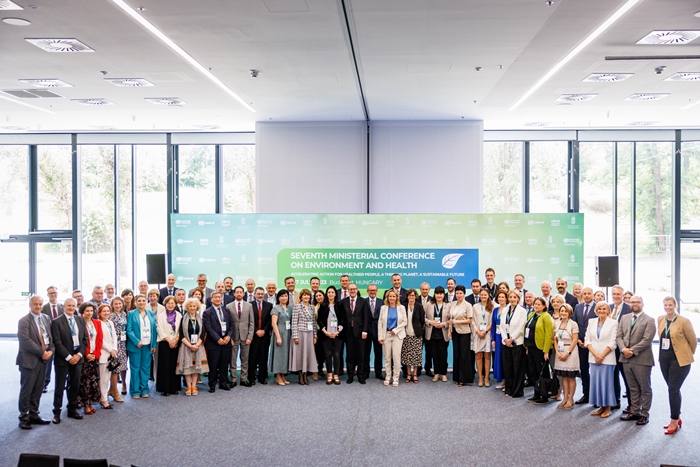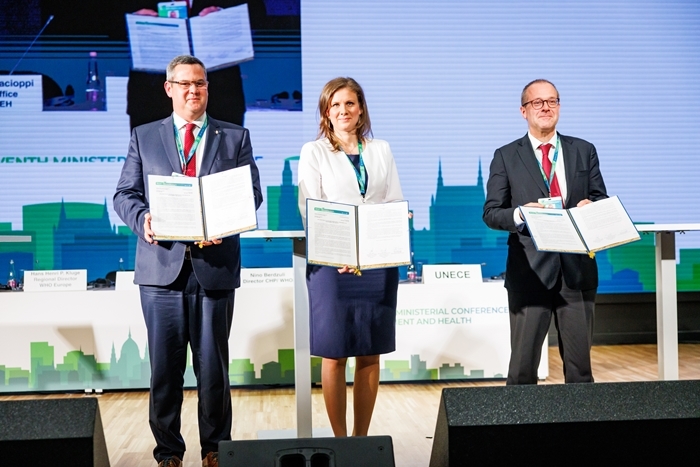Turkmenistan’s experience in addressing global environmental and health challenges was presented at the Seventh Ministerial Conference on Environment and Health Protection held on 5-7 July in Budapest (Hungary) under the auspices of the European Environment and Health Process (EHRP), the Ministry of Health and Medical Industry of Turkmenistan reports in the newspaper “Neutral Turkmenistan”.
It was co-organized by the WHO Regional Office for Europe, the United Nations Economic Commission for Europe and the United Nations Environment Programme.
The delegation of Turkmenistan included heads and representatives of the Cabinet of Ministers, ministries of health and medical industry, agriculture and the environment.
During the conference, the delegation of Turkmenistan made a report, which highlighted the priorities and achievements of the country in the field of health and environmental protection, combating climate change and its consequences.
As known, Turkmenistan adopted a new edition of the National Climate Change Strategy in 2019, according to which all sectors of the economy experience modernization, including oil and gas, industrial, agricultural, transport and others. Water-efficient and energy-saving technologies are being introduced everywhere, adaptation measures are being implemented to restore forests and improve land use to mitigate climate impacts.
In accordance with the updated National Forest Program for the period 2021-2025, millions of tree seedlings are planted annually in the country.
At the initiative of Turkmenistan, two UN GA Resolutions were adopted, including on “Cooperation between the United Nations and the International Fund for Saving the Aral Sea”. Turkmenistan has implemented and continues to implement a number of proposals to enhance cooperation between the countries of the region in order to improve the environmental and socio-economic situation in the Aral Sea basin.
In accordance with the National Climate Change Strategy, the effectiveness of work on the systematic reduction of greenhouse gases, mainly methane emissions, arising in various sectors of the economy is monitored. To this end, an Intersectoral Commission on Reducing Methane Emissions was established in the country.
Within the framework of the National Climate Change Strategy, the Ministry of Health and Medical Industry of Turkmenistan, in cooperation with the WHO Regional Office for Europe and the WHO Country Office in Turkmenistan, in 2020 developed and approved the National Action Plan (2020–2025) for adapting the health of the population of Turkmenistan to climate change and its adverse impacts.
Currently, in accordance with the obligations under the Paris Agreement, Turkmenistan is developing the Fourth National Communication on Climate Change and the First Biennial Communication of Turkmenistan under the UN Framework Convention on Climate Change.
The participants of the Ministerial Conference were particularly interested in the presented experience of Turkmenistan, which was among the first countries in Central Asia in 2022 to adopt and implement the “Action Plan to prevent the effects of heat on the population’s health in Turkmenistan”. The plan was developed with the support of WHO.
***
The main outcome of the conference was the political Declaration of the Seventh Ministerial Conference on Environment and Health – the Budapest Declaration and the “Roadmap for healthier people, a thriving planet and a sustainable future 2023–2030”.
The Declaration prioritizes urgent, wide-ranging action on health challenges related to climate change, environmental pollution, biodiversity loss and land degradation, along with, and in the context of, recovery from COVID-19. To strengthen countries’ capacities to fulfill commitments made under the Declaration, it also focuses on strengthening governance, investing in human resources, and advancing knowledge and tools for action.
The Declaration also offers countries the possibility to launch European Environment and Health Process (EHP) Partnerships, a new mechanism within the EHP, to help accelerate the implementation of the vision and commitments made at the Ministerial Conference. The Partnerships bring together countries and partners with a shared interest in a specific thematic area to work together on joint projects, capacity-building activities, training and workshops, the provision of technical assistance, collaboration in innovation and research, and the dissemination of relevant WHO guidelines.
***
On the sidelines of the Ministerial Conference, the delegation of Turkmenistan had a meeting with the WHO Regional Director for Europe Dr. Hans Kluge, to discuss the preparations for a Scientific conference of medical and sanitary departments of the Non-Aligned Movement and other countries, to be held in Ashgabat this year. ///nCa, 13 July 2023 [photo credit – WHO/Europe]
#WHO, #Turkmenistan, #Seventh_Ministerial_Conference_on_Environment_and_Health_Protection, #climate_change, #health

